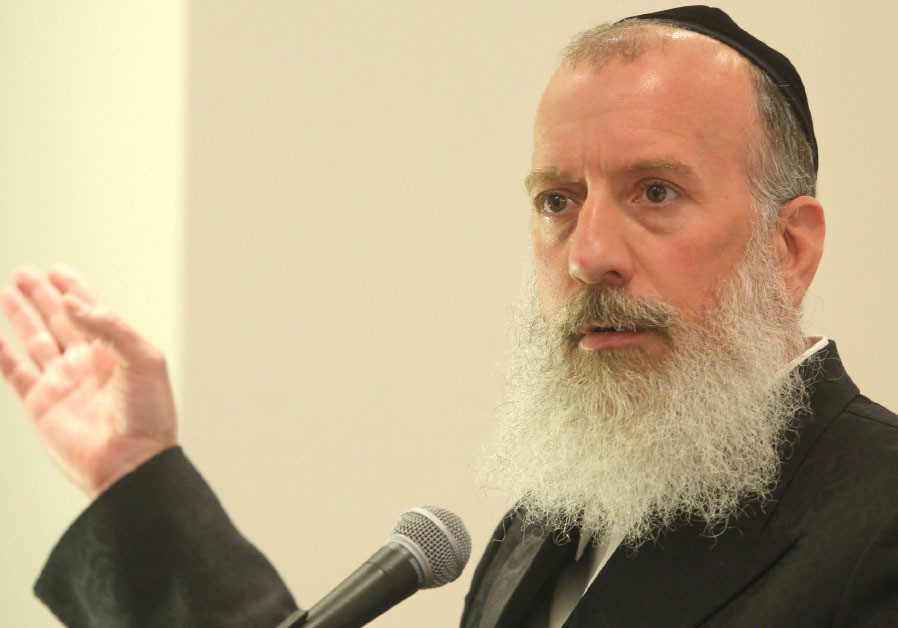Who’s who in the race for Jerusalem city council?

… haredi mayoral candidate Yossi Daitch. . (photo credit: MARC ISRAEL SELLEM)
With municipal elections around the country only ten days away, Jerusalem residents are facing a big choice. There are 10 lists running for 30 seats in the next Jerusalem city council – with the 31st seat belonging to the next elected mayor. Each mayoral candidate must also present a list, so six of the lists are aligned with the six final candidates, and there are four additional local lists.
The six mayoral candidates are Ze’ev Elkin, Moshe Lion, Ofer Berkovitch, Yossi Daitch, Haim Epstein and Avi Salman.
Notable about these elections is the splitting of the traditionally strongest political groups. If there is a central trend in Jerusalem, it is the fact that the religious, the Likud, and the haredim (ultra-Orthodox) have departed from their traditional unity to compete in separate groups.
The national religious are split into two lists: the “official” Bayit Yehudi list headed by Chagit Moshe, and the Me’uchadim (United) list headed by Arieh King, which perhaps represents the more radical religious and right-wing elements of this camp.
The Likud is divided into no fewer than four groups. The one officially aligned with candidate Elkin is formed by the remnants of exiting Mayor Nir Barkat’s list and still bears the name “Jerusalem Will Succeed.” However, Elkin also draws large support from activists in the Likud rank and file. The second group is the official Likud council list, led by former deputy mayor Elisha Peleg.
The third Likud-oriented group is that of Lion, himself a Likud member with significant support from Likud members and activists who are also represented in his list. Finally, there is candidate Salman, whose list is based mostly on active members of the Likud in Jerusalem.
The most notable split is probably in the haredi sector, which is running four lists and two candidates for mayor. This is unprecedented – and is an indication that profound changes are occurring inside this society.
“The times when one rabbi and spiritual leader told all the haredim who they should vote for is over,” says a source in that sector. “Today each group in the sector decides for itself and even the few rabbis who still declare what their followers should do inside the voting booth know that this is not always what will happen.” The hassidic group is running with Daitch; Degel Hatorah is running a separate list of its own, as is Shas, and those two groups support Lion. Finally, there is the Peleg Yerushalmi list, a radical splinter group from Degel Hatorah led by candidate Epstein.
Ofer Berkovitch is emerging as the candidate of choice for voters – from secular to modern Orthodox – who have reservations regarding a Haredi candidate or a religious candidate identified with the Right. This is the message he is conveying to the general public: students, young adults, and more recently the moderate religious and the middle-aged generation.
Meretz, which traditionally captures two or even three seats at the council, is no longer the only actor on the social activism front with the emergence of former city legal adviser Yossi Havilio, who dropped out of the race for mayor but is running a separate list for council seats. Honesty, morality (even in the political arena), watching over by elected officials – all of which for years were the buzzwords of Meretz, are now also the call to action for Havilio’s list (Saving Jerusalem).
The Labor Zionist Camp has completely disappeared from the arena; its last representative, Itay Gutler, decided not to run.
One of the interesting new alliances made is the agreement between King and Daitch. If Daitch is elected, he will make King president of the local committee for planning and construction – a position King intends to leverage to enlarge the number of Jewish residents in predominantly Arab neighborhoods on the east side. Daitch’s decision in this regard indicates two things: 1. Jerusalem might be the first arena with alliances and collaboration between haredim and national religious from the Right wing; 2. Daitch feels that while he is the representative of a large part of the haredi sector, he still can take independent actions not necessarily aligned with the positions of his haredi party. Interestingly, Daitch maintains that the largest support he gets from the non-haredi sector comes from secular and left-wing residents, something that his alliance with King seemingly hasn’t affected.
Join Jerusalem Post Premium Plus now for just $5 and upgrade your experience with an ads-free website and exclusive content. Click here>>






Comments are closed.